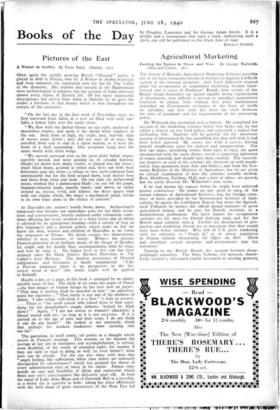Books of the Day
Pictures of the East
A Winter in Arabia. By Freya Stark. (Murray. i6s.)
ONCE again the rapidly growing British "Oriental " public is placed in debt to Faraya, who by A Winter in Arabia maintains and even enhances the reputation won for her by The Valley of the Assassins. Her journey and sojourn in the Hadhramaut were archaeological in purpose, but her account of them embraces almost every aspect of Eastern life. Of her many memorable descriptions, her arrival from Aden at Mukalla by air gives the reader a foretaste of that beauty which is shot throughout the texture of the narrative:
" On the last day in the first week of November, 1937, we flew eastward from Aden, in a cool air filled with early sun- light, a honey light over the sandy shore.
" We flew with the Indian Ocean on our right, puckered in motionless ripples, and upon it the broad white roadway of the sun. Seen from so high, the triple, lazy, lace-like edge of waves crept slowly ; they did not turn all at once, but unrolled from end to end in a spiral motion, as it were the heart of a shell unwinding. Our aeroplane hung over the azure world with silver wings.
" We moved eastward even as the great globe below imper- ceptibly moved, and were gaining on its circular horizon. Sharks far down were dimly visible, so limpid was the water ; small black boats, pointed at either end, were out with their fishermen near the shore ; a village or two, earth-coloured huts unnoticeable but for the field around them, took shelter here and there from wind and sand. On our right the unfurrowed ocean, marked like a damascened blade ; on our left the gaunt, leopard-coloured lands, equally lonely; and above, or rather around us, joyous, vivid, and infinite, the skyey spaces loud with our engine which, like many a mechanical mind, listens to its own voice alone in the silence of creation."
At Hureidha the author's health broke down. Archaeology's temporary loss became our immediate gain, for her daily recep- tions and conversations, bravely endured under exhaustion some- times affecting her heart, resulted in a diary (every day of which is adorned by an appropriate heading—with a variety of four or five languages) and a portrait gallery which make us feel we know the men, women and children of Hureidha as we Know the characters of Proust. No detail escapes her observations, whether of men, manners or minds. Witness the picture, Flemish-primitive in its brilliant detail, of the Singer of Qasidas, his single and his double flute accompaniment, what he sings, and how he sings it. No higher level in this sort has been attained since Sir Mark Sykes's Mevlevi Dervishes in The Caliph's Last Heritage. The dateless persistence of Oriental indignations and bitterness is finally summarised : " Like a Persian miniature there is no perspective in the his- torical mind of Asia " (the simile might well be applied to Ireland).
Hardly a day, or a page, of this book is untinged by an admir- mirable sense of fun. The child of six turns the pages of Punch —the first images of human beings he has ever seen on paper: "That man is smiling, God be merciful to him " (an advertise- ment for cigarettes) ; " That surely is not one of the children of Adam. I take refuge with God, it is a Jinn " (a lady in corsets). . . . There is " the small cousin who joined them to find some- thing for his grandfather's cough, hitherto ' helped by Allah alone!' " Again, " I am not averse to women's education,' a liberal sayyid told me, ' so long as it is not excessive. If it is carried on to the age of nine and then stops, I do not think it can do any harm? ' He looked at me anxiously, afraid that perhaps his modern tendencies were carrying him too far."
The quotation, in itself comic, yet points to a thought which recurs in Faraya's musings. This woman, so far beyond the average of her sex in enterprise and accomplishment, is critical, even doubtful, of the worth of extended rights for women if they are only to lead to doing as well (or even better!) what men can do already. Yet she can also share with men that " angry feeling, like suffocation, when clear orders are ruinously disregarded by subordinates? which has gripped the throat of every administrator once or twice in his career. Faraya com- mands an ease and flexibility of idiom and expression which floats into one's consciousness like delicately spun silk. At least the equal of Lady Anne Blunt and of Gertrude Bell as a traveller, as a writer she is superior to both : taking her place effortlessly with the little band of great interpreters of the Near East led by Doughty, Lawrence and Sir George Adam Smith. It is a delight and a reassurance that such a book, embodying such a spirit, can still be published in this black June of 194o.
RONALD STORRS.


























 Previous page
Previous page